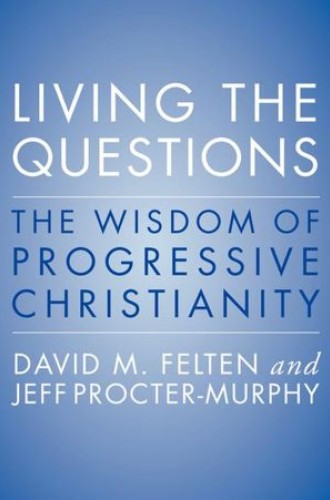Living the Questions, by David M. Felten and Jeff Procter-Murphy
On more than one occasion, pastors and laypersons from progressive congregations have confided in me, “We are a little weak in our theology; we know what we don’t believe but have trouble articulating our own faith to one another and to newcomers.” They recognize that a vital faith lives by its affirmations as well as its negations, especially in times of crisis and uncertainty.
The Living the Questions DVD series, created by David Felten and Jeff Procter-Murphy, was intended to inspire theological reflection among mainstream and progressive Christians, and it has succeeded in providing a platform for theological alternatives to the popular messages of conservative and fundamentalist writers, preachers and televangelists. Felten and Procter-Murphy’s Living the Questions: The Wisdom of Progressive Christianity provides in book form the insights of Living the Questions 2.0: An Introduction to Progressive Christianity, a DVD and Internet program the authors also created. The volume reflects a few of the challenges facing progressive Christianity in its mission to “rejuvenate the faith and illuminate a lifelong spiritual path for thinking Christians.”
Read our latest issue or browse back issues.
The book is divided into three sections: “Journey,” an overview of progressive Christianity; “Reconciliation,” focusing on healing the relationship of God, humankind and the planet; and “Transformation,” a spiritual pathway for progressive Christians. The first section, “Journey,” is primarily deconstructive in approach. Although it clearly and accurately depicts the profound differences between fundamentalist and progressive visions of Christianity, its theology is vague and takes second place to a celebration of the virtues of theological ambiguity and openness.
The authors believe that we are on a journey whose horizons are constantly receding. In the spirit of Zen Buddhist wisdom, they recognize that we often confuse the moon with a finger pointing to the moon—confuse the divine reality with our theological reflections on God and the world. Still, it is clear that, like Socrates, the authors are more certain about misguided theological paths than they are about charting the best theological paths for progressive Christians.
The authors’ vagueness is in line with their affirmation of Mordecai Kaplan’s counsel: “A religion is as much a progressive unlearning of false ideas concerning God as it is the learning of the true ideas concerning God.” There is virtue in theological vagueness, but there is also a need for concrete, albeit fluid, visions of God and the world. People cannot live by deconstruction alone. A more in-depth discussion of biblical authority and inspiration, of the meaning of revelation and of the character of the God-world relationship, would have been helpful in this section.
If fundamentalists claim to know too much about God and human destiny, progressives often claim to know too little about key theological issues. When the world cries out for a few “thus saith the Lord” affirmations, “it seems to me” is often the strongest declarative homiletic statement from many progressive preachers. Over the years, I have heard many congregants in progressive churches complain that although their pastor’s sermons are well crafted and erudite, they find very little affirmative theological substance to take home with them.
The second section, “Reconciliation,” focuses on healing relationships with God, humankind and the nonhuman world. This section is more definitive in its deconstruction of fundamentalist theories of atonement, redemptive violence and the rapture and second coming. If there is a “thus saith the Lord” in this text, this section is where you will find it. In contrast to otherworldly visions of salvation, the authors see salvation as blessing that defends what is beautiful and nurtures goodness. The authors’ theological minimalism is reflected in their description of resurrection as a metaphor that calls us to new life.
The authors give scant attention to life after death, despite its importance to many Christians. Hope in this lifetime may involve the affirmation of evolution and adventure beyond the grave. Given the growing interest in near-death experiences and survival after death among seekers, progressive Christian theologians need to explore more fully what the afterlife might look like from a progressive perspective.
The final section, “Transformation,” describes a holistic, earth-affirming and socially conscious spirituality. The authors affirm the universality of incarnation, noting that “the incarnation is finally not just about Jesus alone but us. . . . Wherever we find ourselves, the mystery of life dwells within us, not limited to time or place, but manifest in every aspect of our lives.” Divine revelation is thus not restricted to Christians, but is the fundamental reality of all human experience, regardless of one’s faith tradition or unbelief.
The authors challenge popular understandings of prayer, describing them as forms of “prayer abuse” in which we expect supernatural interventions to benefit ourselves and those for whom we pray. While the authors assert that we cannot expect dramatic responses to our prayers, they nevertheless see prayer as a source of connection with ourselves and God and of inspiration and guidance for facing life’s challenges. Prayer is about openness and mindfulness that transform us first and may lead to changes in our overall well-being.
The authors affirm that progressive Christianity is about embracing mystery. There is always more to God and us than we can fathom. Accordingly, the authors believe that the necessary incompleteness of our theology is an invitation to ongoing creative transformation, personal and congregational.
The weaknesses I’ve noted reflect the limitations of most progressive theologies. In spite of those weaknesses, Living the Questions is an excellent introduction to progressive theology, especially for those who are viewing the DVD series. It may inspire progressive thinkers to become bold and creative in articulating progressive theologies and practices.






